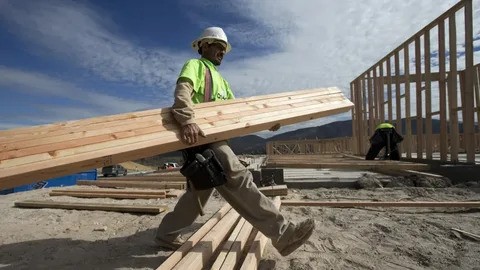Construction Jobs in the USA
The construction industry is a vital component of the U.S. economy, responsible for creating and maintaining the infrastructure that supports daily life. From residential buildings to commercial spaces and large-scale public projects, construction jobs offer a wide array of career opportunities for individuals with diverse skills and backgrounds. This article explores the landscape of construction jobs in the USA, delving into the types of positions available, the skills required, career prospects, and the benefits and challenges associated with working in this dynamic industry.
1. The Construction Industry Landscape
The construction industry is a significant contributor to the U.S. economy, accounting for approximately 4% of the Gross Domestic Product (GDP) and employing over 7 million workers as of 2021. According to the U.S. Bureau of Labor Statistics (BLS), employment in the construction sector is projected to grow by 5% from 2021 to 2031, adding about 400,000 new jobs. This growth is driven by various factors, including population growth, urbanization, and the need for infrastructure improvements.
1.1 Key Sectors of Construction
The construction industry can be divided into several sectors, each focusing on different types of projects:
- Residential Construction: Involves building and renovating homes, apartments, and other living spaces. This sector includes single-family homes, multifamily dwellings, and luxury estates.
- Commercial Construction: Encompasses the construction of commercial buildings, such as offices, retail spaces, hotels, and warehouses. This sector is critical for supporting business activities and economic growth.
- Industrial Construction: Focuses on constructing facilities for manufacturing, power generation, and other industrial operations. This sector includes factories, power plants, and distribution centers.
- Infrastructure Construction: Involves building and maintaining public infrastructure, such as roads, bridges, airports, and utilities. This sector is vital for ensuring the safety and efficiency of transportation systems and public services.
2. Types of Construction Jobs
Construction jobs encompass a wide range of positions, from skilled trades to management roles. Here are some common types of construction jobs available in the USA:
2.1 Skilled Trades
Skilled trades are essential to the construction process and require specialized training and experience. Some common skilled trade positions include:
- Carpenters: Responsible for constructing, installing, and repairing structures made of wood and other materials. Carpenters work on framing, flooring, and cabinetry.
- Electricians: Install, maintain, and repair electrical systems in residential, commercial, and industrial settings. Electricians ensure that electrical systems are safe, functional, and compliant with codes.
- Plumbers: Install and repair plumbing systems, including pipes, fixtures, and appliances. Plumbers work in various settings, ensuring the proper distribution of water and waste removal.
- Masons: Work with brick, stone, and concrete to build and repair structures. Masons create walls, patios, and other structures, often requiring physical strength and precision.
- Welders: Join metal components using various welding techniques. Welders play a crucial role in fabricating and assembling metal structures in construction.
2.2 General Labor
General labor positions support skilled trades and construction activities. Common roles include:
- Construction Laborers: Perform various tasks on construction sites, including digging, lifting, and cleaning. Laborers are often responsible for site preparation and assisting skilled trades.
- Equipment Operators: Operate heavy machinery, such as bulldozers, excavators, and cranes, to move materials and complete construction tasks. Equipment operators must be trained and certified to operate specific machinery.
2.3 Management Positions
Management roles in construction are essential for overseeing projects and ensuring successful execution. Common management positions include:
- Construction Managers: Oversee construction projects from inception to completion, coordinating schedules, budgets, and resources. Construction managers ensure that projects meet quality standards and are completed on time.
- Project Managers: Focus on specific projects, managing the planning, execution, and delivery phases. Project managers work closely with clients, contractors, and subcontractors to achieve project goals.
- Site Supervisors: Responsible for overseeing daily operations on construction sites, ensuring safety protocols are followed and work is progressing according to plan.
- Estimators: Analyze project specifications and prepare cost estimates for construction projects. Estimators play a critical role in budgeting and securing contracts.
3. Skills and Qualifications for Construction Jobs
While specific requirements may vary by position, certain skills and qualifications are generally essential for success in the construction industry:
3.1 Education and Training
- High School Diploma or GED: Many entry-level construction jobs require a high school diploma or equivalent. This educational background provides foundational skills necessary for various roles.
- Vocational Training: Skilled trades often require vocational training or apprenticeship programs to develop specific skills and gain hands-on experience.
- Certifications: Some positions may require specific certifications, such as OSHA (Occupational Safety and Health Administration) training for safety compliance or specialized certifications for operating heavy machinery.
3.2 Essential Skills
- Physical Stamina: Construction work can be physically demanding, requiring workers to lift heavy materials, stand for long periods, and perform repetitive tasks.
- Technical Skills: Familiarity with tools, machinery, and construction techniques is essential for many positions. Workers should be comfortable using a variety of equipment safely and efficiently.
- Attention to Detail: Precision is crucial in construction, as small errors can lead to significant issues. Attention to detail helps ensure that work meets specifications and quality standards.
- Teamwork: Construction projects often involve collaboration among various workers and trades. The ability to work effectively in a team is essential for successful project completion.
- Problem-Solving Abilities: Construction workers frequently encounter unexpected challenges. Strong problem-solving skills are necessary for finding effective solutions on the job.
4. Career Opportunities and Advancement
The construction industry offers numerous opportunities for career advancement. Here are some potential career paths for individuals in this field:
4.1 Entry-Level Positions
Many individuals start their careers in entry-level positions, such as construction laborers or apprentices. These roles provide valuable experience and exposure to different aspects of the industry.
4.2 Skilled Trades
After gaining experience, individuals can pursue skilled trades roles, such as carpenters, electricians, or plumbers. Specializing in a trade can lead to higher pay and greater job security.
4.3 Supervisory and Management Roles
With experience and training, workers can move into supervisory or management positions. These roles involve overseeing teams, managing projects, and ensuring quality control.
4.4 Project Management
Experienced construction professionals may transition to project management roles, where they are responsible for planning, executing, and delivering construction projects. Project managers often require additional training in project management methodologies.
4.5 Entrepreneurship
Some construction professionals choose to start their own businesses, offering specialized services or general contracting. Entrepreneurship requires a strong understanding of business management, finances, and marketing.
5. Benefits of Working in the Construction Industry
Working in construction offers several benefits that make it an appealing career choice:
5.1 Job Stability
The construction industry provides a level of job stability, as there is a constant demand for skilled workers to build and maintain infrastructure. Even during economic downturns, construction jobs are often less affected than other industries.
5.2 Competitive Pay
Many construction jobs offer competitive salaries, especially for skilled trades and management positions. Pay can vary based on location, experience, and specialization.
5.3 Opportunities for Skill Development
The construction industry provides ample opportunities for workers to develop new skills and advance their careers. Many companies offer training programs and apprenticeships to help employees gain expertise.
5.4 Variety of Work
Construction jobs often involve working on different projects, providing variety and preventing monotony. Workers can experience a range of tasks and environments, from residential homes to large commercial buildings.
5.5 Physical Activity
For individuals who prefer an active job, construction work can be a great fit. Many positions involve physical labor, providing a level of exercise that can contribute to overall health and well-being.
6. Challenges of Working in the Construction Industry
Despite the benefits, there are also challenges to consider when pursuing a career in construction:
6.1 Safety Risks
Construction sites can be hazardous, and workers must adhere to strict safety protocols to minimize risks. Safety training and compliance are crucial to preventing accidents and injuries.
6.2 Weather Conditions
Construction work is often subject to weather conditions, which can impact schedules and working hours. Workers may face heat, cold, rain, or snow, requiring adaptability and resilience.
6.3 Physically Demanding Work
While many enjoy the physical nature of construction work, it can also lead to fatigue and strain. Workers must prioritize self-care and proper lifting techniques to prevent injuries.
6.4 Irregular Hours
Construction projects may require workers to be flexible with their schedules, including working overtime or on weekends to meet deadlines. This irregularity can be challenging for those seeking a consistent routine.
6.5 Economic Fluctuations
The construction industry can be affected by economic cycles, leading to fluctuations in job availability. During economic downturns, some projects may be delayed or canceled, impacting employment.
7. How to Find Construction Jobs in the USA
If you’re interested in pursuing a career in construction, here are some effective strategies for finding job opportunities:
7.1 Job Boards and Websites
Online job boards such as Indeed, Glassdoor, and CareerBuilder regularly list construction job openings across the country. These platforms allow you to filter positions based on location, job type, and experience level.
7.2 Company Websites
Many construction companies post job openings directly on their websites. Research local construction firms or larger contractors to find available positions.
7.3 Trade Schools and Apprenticeship Programs
Consider enrolling in trade schools or apprenticeship programs that offer training and job placement services in construction. These programs can provide valuable skills and connections in the industry.
7.4 Networking
Leverage your network to learn about job openings. Connect with friends, family, or acquaintances in the construction industry, as they may have insights or recommendations for available positions.
7.5 Local Employment Agencies
Local employment agencies specializing in construction can assist in finding job opportunities and provide valuable advice on navigating the application process.
8. Preparing for a Career in Construction
If you’re ready to pursue a career in construction, here are some steps to help you prepare:
8.1 Research Requirements
Before applying for positions, research the qualifications and skills needed for the specific roles you are interested in. This information will help you tailor your applications effectively.
8.2 Gain Experience
Consider internships or part-time positions in construction or related industries to gain valuable experience and insights into construction operations.
8.3 Develop Relevant Skills
Focus on developing essential skills for the construction industry, such as technical skills, problem-solving abilities, and safety awareness. Participating in workshops or training programs can also be beneficial.
8.4 Build a Strong Resume
Tailor your resume to highlight your skills and experiences relevant to construction positions. Be sure to include any relevant training, certifications, and previous job experiences.
8.5 Prepare for Interviews
Practice common interview questions and scenarios you might encounter in the construction field. Employers often look for candidates who can demonstrate a strong work ethic and a willingness to learn.
Construction Jobs in the USA
Construction jobs in the USA offer a wide range of opportunities for individuals seeking a fulfilling and stable career in a vital industry. With various positions available across different sectors, employees can find roles that align with their skills and interests. While the industry presents challenges, such as safety risks and fluctuating economic conditions, the benefits—such as job stability, competitive pay, and opportunities for skill development—make construction an attractive career choice. By preparing effectively and actively seeking opportunities, you can build a successful career in the diverse and dynamic construction industry.



